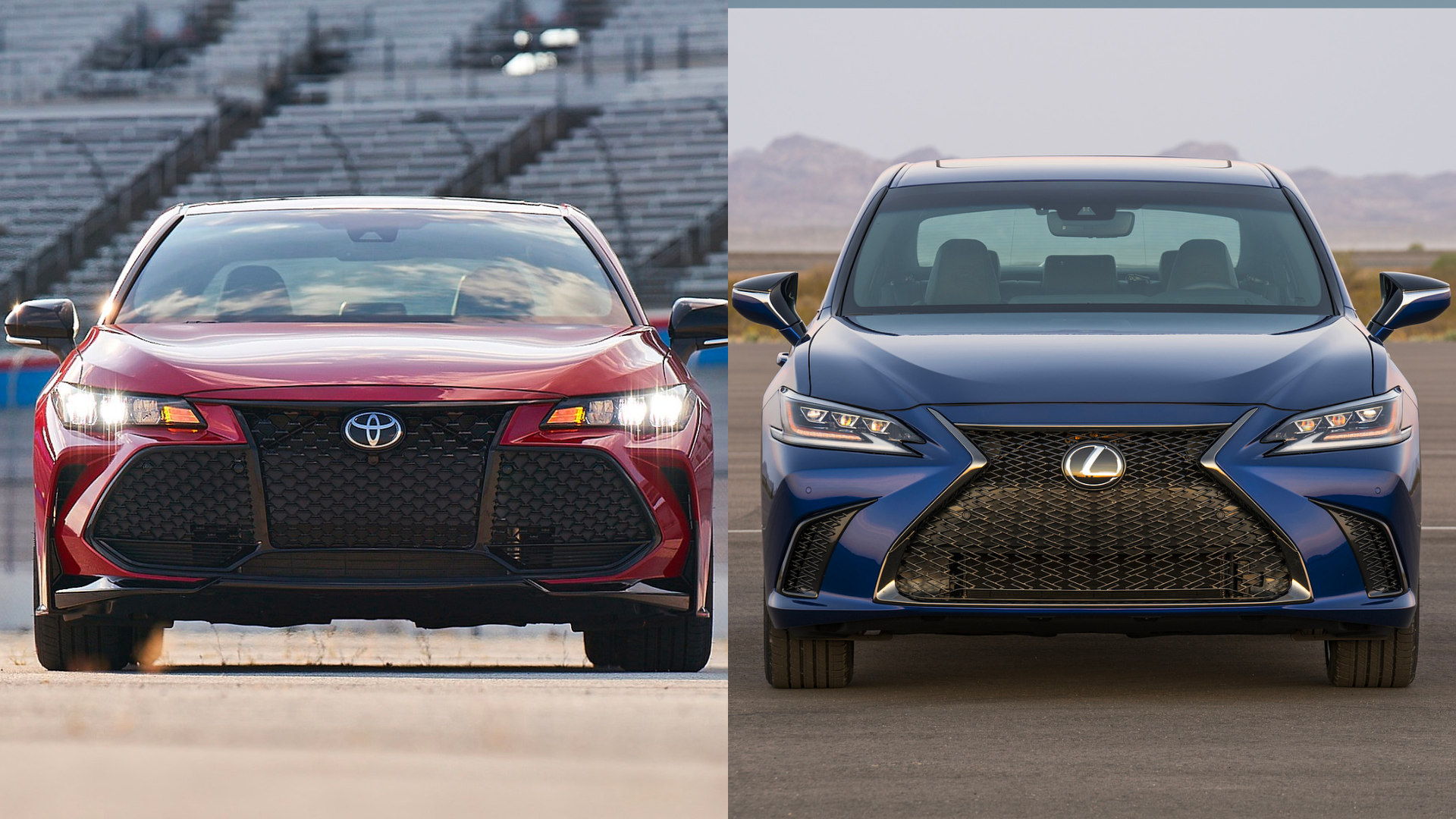They may be two different marques but of course, Lexus and Toyota are within the same corporate family. How does the flagship Lexus sedan compare to the top-end Toyota Avalon? Does the very top end of the regular brand beat the standard end of the luxury brand? Let’s take a closer look at these two iconic luxury sedan models to see how they compare.
Quick Summary
The Toyota Avalon and Lexus ES are full-size sedans that share many of the same parts and are built on the same chassis. While both are considered luxury sedans, the Lexus ES offers higher trims which offer an even greater level of luxury than the Avalon’s highest trim. People who want the more prestigious Lexus badging and even finer interior upholstery will find the Lexus to be worth the extra money. Otherwise, it’s very close.
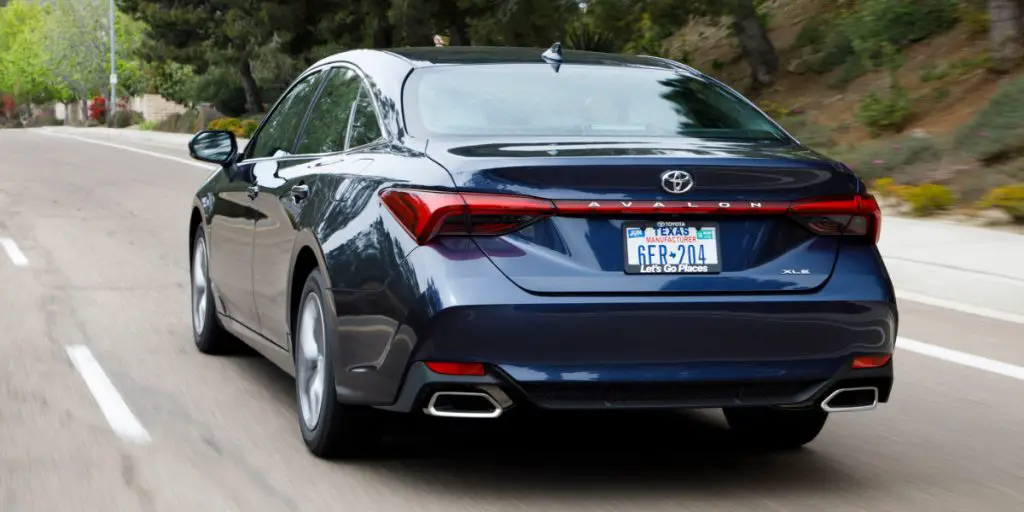
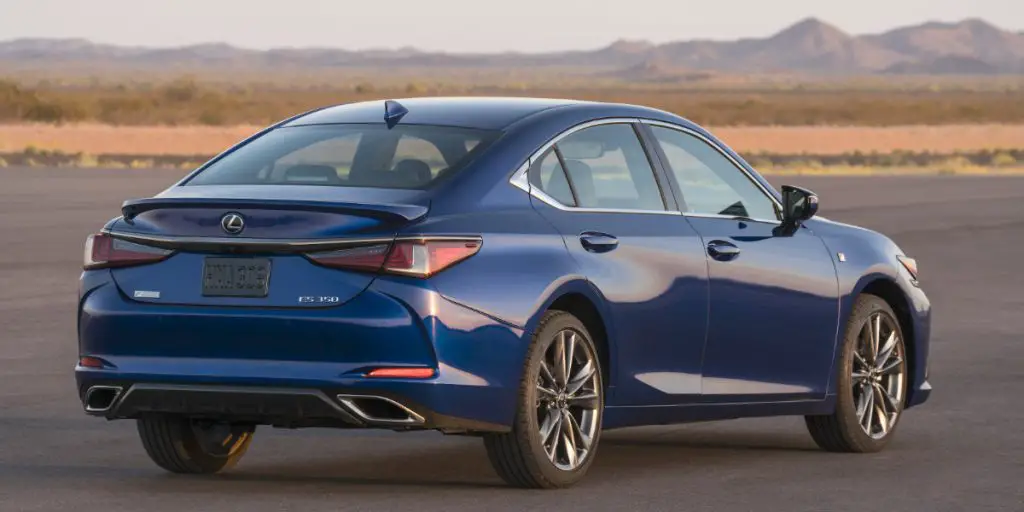
Pricing
The starting prices for these luxury sedans are not as far apart as one might expect. The base trims actually start at relatively close price points, but the highest trims of the Lexus ES are considerably more expensive than the top-end Toyota Avalon.
The Toyota Avalon starts at $36,275, whereas the Lexus ES starts at $40,800. At the top end of the Avalon range is the Avalon Limited Hybrid, which starts at $43,550.
For the ES it’s a bit more complex because there are so many “top” models, including the ES 250 Ultra Luxury AWD ($49,980), the ES 350 Ultra Luxury ($49,980), and the ES 300h Ultra Luxury ($51,080). It depends on what type you’re after.
Exterior and Interior Styling
Both of these sedans fall into the “luxurious” bracket, but the difference is that a Lexus is meant to be naturally more luxurious than just about any Toyota. The Avalon is the top-end of the Toyota sedan scale. Both are quite well matched when it comes to scale and grandeur. Both have the same 113-inch wheelbase, for instance.
For the exterior, however, Lexus could be said to have the edge because its front grille and fascia are both a lot more extravagant in their design and finish than the Avalon. The Avalon exterior has a hint more of the executive look compared to the Lexus ES, but the Lexus has more of the decadent affluence about it.
In many ways, however, the two are still quite similar in their exterior designs. Certainly, the scale, lines, and overall grandeur of the two are fairly close.
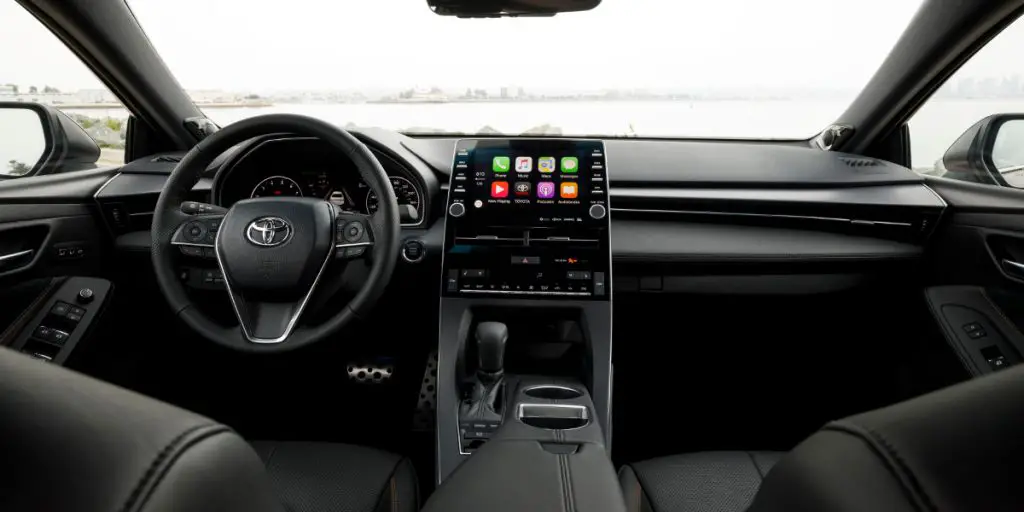
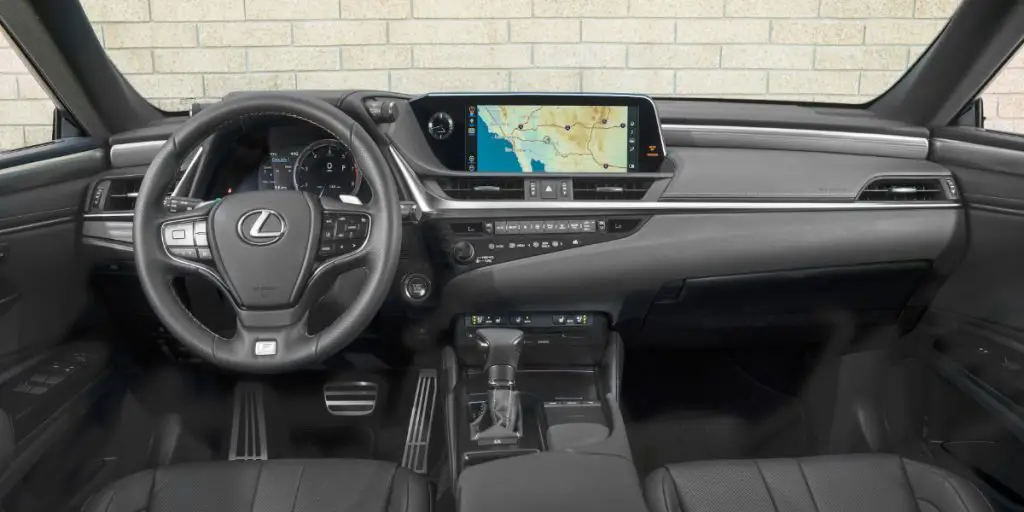
For interiors, it’s fair to say that both are supremely comfortable and have strong features that may appeal to different audiences. The Avalon, for instance, offers a waterfall-style center stack sloping down and integrating into the central armrest. The Lexus ES is a little edgier with an asymmetrical design and generally favors darker colors.
The Avalon’s two-tone leather upholstery and dash color combinations look very high-end, but the overall finish in even the base Lexus is very fine, and then climbs even higher from there. The Lexus ES certainly offers more room to go “up” in class and comfort for the interior compared to the Avalon, which is already the zenith of Toyota sedans.
Performance
Both of these luxury sedan models come fitted with a 3.5L V6 option and at their top-end, both offer an almost identical maximum horsepower: 301-hp to the Toyota Avalon, and 302-hp to the Lexus ES.
The main difference is that the 3.5L V6 is the only option for the Avalon models, except the Hybrid, which carries a 2.5L 4-cylinder unit. The Lexus carries a 2.5L 203-hp engine as standard for the ES 250 models, with the 3.5L V6 being used on the ES 350 models. The Lexus ES hybrids also use a 2.5L 4-cylinder engine getting up to 215-hp.
Ultimately, this means that all the Avalon gasoline models carry more horsepower than the ES 250 and ES hybrid models from Lexus, but the ES 350 models can (just) out-power the Avalon models. The Avalon hybrids are a match for the Lexus ES hybrids, since they use the same 2.5L cylinder engine with up to 215-hp.
On the road, both offer decent handling and capability. One difference is that while the Avalon handles essentially the same across all trim levels, but with a good, quiet, and comfortable ride quality, the Lexus ES at least has some additional options within the trims, especially the F Sport trim. The ES F Sport offers a bit more dynamism to the Lexus ES that no Avalon trim can really match.
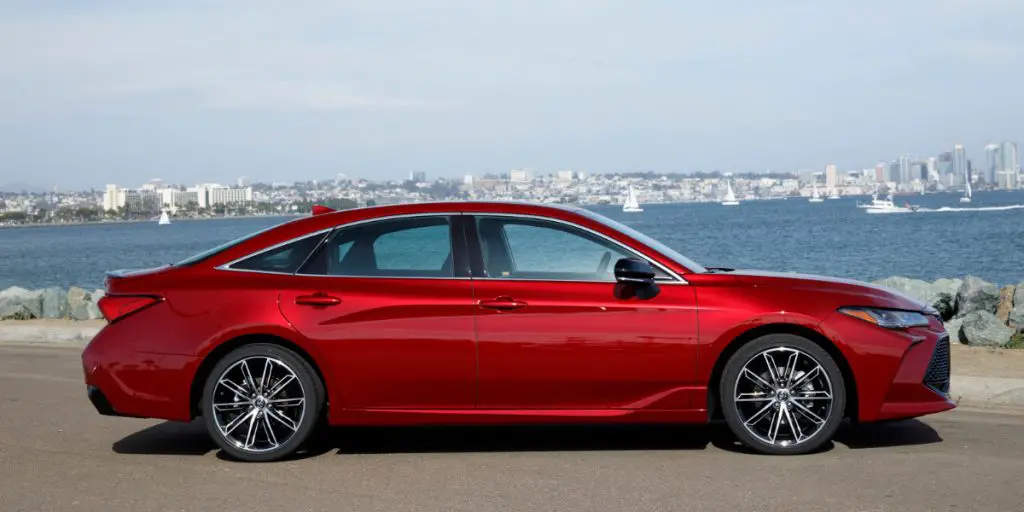
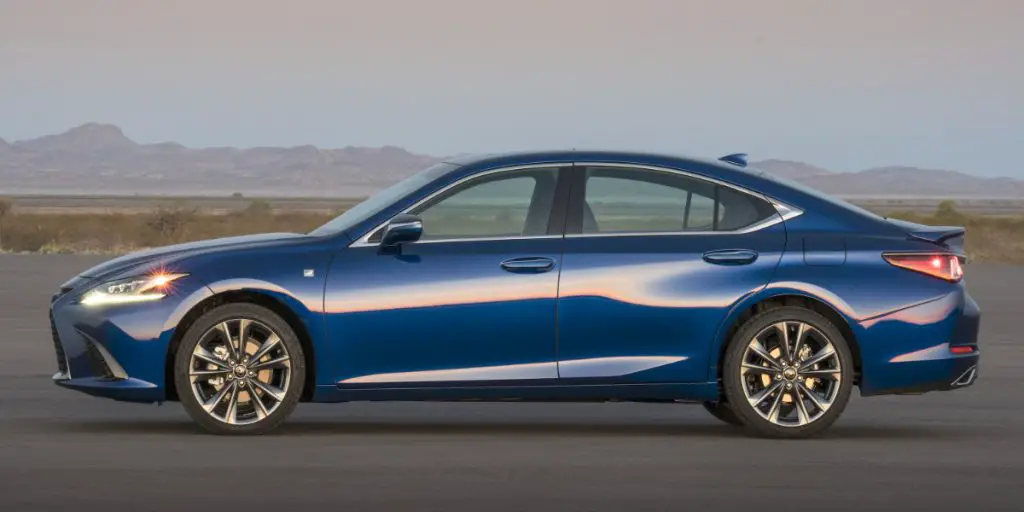
Practicality and Fuel Economy
When it comes to sedans, one somewhat sore point for many is the lack of trunk space. Even though the cabins are often larger, the cargo capacity isn’t. The Toyota Avalon offers more in pure trunk space at 16.09 cubic feet. The Lexus ES only manages 13.9 cubic feet. It’s not a dramatic difference, but makes all the difference when you’re trying to get that last bag in place!
Next, let’s look at fuel consumption. The base-level Lexus ES 250 AWD uses 25-mpg in the city, and 34-mpg on the highway, giving it a combined rating of 28-mpg. The Toyota Avalon base XLE trim achieves 22-mpg in the city, and 32-mpg on the highway, with a combined rating of 27-mpg. That means the basic Lexus ES gains an edge in fuel efficiency.
For the hybrid models, the Avalon model gets 43-mpg both in the city and on the highway; the Lexus ES hybrid models get 43-mpg in the city and 44-mpg on the highway, making it barely more efficient by a mere whisker. In terms of fuel efficiency, the Lexus ES comes out on top but only barely. The reality is that there’s little to no difference.
Technology & Features
Lexus ES drivers are treated to a very modern and crystal-clear 12.3-inch touchscreen if they want — an 8-inch screen is standard — which is fast, easy to use, and very user-friendly. There’s also a 10-speaker sound system as standard. Drivers get a 10.2-inch HUD for the driver, as well as wireless charging, voice commands, a SmartAccess card key, and much more.
The Avalon is not without a good amount of technology, but the infotainment system, while large and clear, is a little older and clunkier to use than that of the Lexus ES. It only has an 8-speaker sound system, but can be upgraded to a very nice JBL sound system.
Safety
Standard features in the Avalon include automated emergency braking, pedestrian detection, lane departure warning, lane keeping assist, and adaptive cruise control.
The Lexus ES gets all the same but throws in lane tracing assist, steering assist with lane departure, road sign assistance, and smart high beams. The Lexus ES also offers many more standard options as you move up through trim levels and also via various packages. In all, it makes for a richer selection than the Toyota Avalon.
Verdict
Clearly, both models have a lot to offer. The Toyota Avalon is a more budget-friendly option, but when you buy the top Avalon you’ve already hit the ceiling only to match what would be less than halfway up the ladder of luxury in the Lexus ES series.
If you just want a simple, comfortable ride with all the basics covered and a nice, reliable vehicle then the Avalon is perfect. If you want to get the most out of your luxury car experience, then the ES has a lot more to offer drivers.
Comparison Table
| 2022 Toyota Avalon | 2022 Lexus ES | |
|---|---|---|
| Trim | ||
| Price | $36275 | $40800 |
| Performance | ||
| Engine | 3.5L V6 Gas | 3.5L V6 Gas |
| Horsepower | 301 hp @ 6600 rpm | 302 hp @ 6600 rpm |
| Torque | 267 lb-ft @ 4700 rpm | 267 lb-ft @ 4700 rpm |
| Transmission | 8-Speed Automatic | 8-Speed Automatic |
| Drivetrain | Front-Wheel Drive | Front-Wheel Drive |
| Handling | ||
| Steering Type | Rack-Pinion | Rack-Pinion |
| Rear Suspension | Multi-Link | Multi-Link |
| Rear Wheel Size | P215/55VR17 | P215/55VR17 |
| Front Suspension | Strut | Strut |
| Front Wheel Size | P215/55VR17 | P215/55VR17 |
| Turning Diameter (ft.) | 37.7 | 38.0 |
| Fuel Economy | ||
| MPG/MPGe - Hwy | 32 | 32 |
| MPG/MPGe - City | 22 | 22 |
| MPG/MPGe - Combined | 26 | 26 |
| Gas Tank Size (gallons) | 14.5 | 15.9 |
| Cruising Range - Hwy (miles) | 464.0 | 508.8 |
| Size and Weight | ||
| Height (in.) | 56.5 | 56.9 |
| Length (in.) | 195.9 | 195.9 |
| Weight (lbs) | 3570 | 3690 |
| Max Width (in.) | 72.8 | 73.4 |
| Wheelbase (in.) | 113.0 | 113.0 |
| Interior Dimensions | ||
| Seating Capacity | 5 | 5 |
| Trunk Volume (cu. ft.) | 16.1 | 13.9 |
| Front Seat Leg Room (in.) | 42.1 | 42.4 |
| Front Seat Head Room (in.) | 38.5 | 37.5 |
| Front Seat Hip Room (in.) | 55.8 | 55.0 |
| Front Seat Shoulder Room (in.) | 58.3 | 55.9 |
| Rear Seat Leg room (in.) | 40.3 | 39.2 |
| Rear Seat Head Room (in.) | 37.9 | 37.8 |
| Rear Seat Hip Room (in.) | 54.8 | 54.3 |
| Rear Seat Shoulder Room (in.) | 57.1 | 54.3 |
| Infotainment Features | ||
| HD Radio | Standard | Standard |
| MP3 Player | Standard | Standard |
| WiFi Hotspot | Standard | Standard |
| Satellite Radio | Standard | Standard |
| Bluetooth Connection | Standard | Standard |
| Entertainment System | Not Available | Not Available |
| Premium Sound System | Optional | Standard |
| Auxiliary Audio Input | Standard | Standard |
| Smart Device Integration | Standard | Standard |
| Hard Disk Drive Media Storage | Not Available | Not Available |
| Interior Trim | ||
| Cloth Seats | Standard | Standard |
| Vinyl Seats | Standard | Standard |
| Leather Seats | Standard | Standard |
| Premium Synthetic Seats | Standard | Standard |
| Bucket Seats | Standard | Standard |
| Sun/Moonroof | Optional | Standard |
| Leather Steering Wheel | Standard | Standard |
| Woodgrain Interior Trim | Standard | Optional |
| Comfort Features | ||
| A/C | Standard | Standard |
| Rear A/C | Not Available | Not Available |
| Telematics | Standard | Not Available |
| Seat Memory | Not Available | Not Available |
| Seat-Massage | Not Available | Not Available |
| Keyless Entry | Standard | Standard |
| Keyless Start | Standard | Standard |
| Cruise Control | Standard | Standard |
| Multi-Zone A/C | Standard | Standard |
| Power Liftgate | Not Available | Not Available |
| Climate Control | Standard | Standard |
| Head-Up Display | Not Available | Optional |
| Power Mirror(s) | Standard | Standard |
| Automatic Parking | Not Available | Not Available |
| Navigation System | Optional | Optional |
| Power Driver Seat | Standard | Standard |
| Cooled Rear Seat(s) | Not Available | Not Available |
| Hands-Free Liftgate | Not Available | Optional |
| Heated Rear Seat(s) | Not Available | Not Available |
| Remote Engine Start | Standard | Standard |
| Cooled Front Seat(s) | Not Available | Optional |
| Heated Front Seat(s) | Standard | Optional |
| Power Passenger Seat | Standard | Standard |
| Remote Trunk Release | Standard | Standard |
| Heated Steering Wheel | Not Available | Not Available |
| Adaptive Cruise Control | Standard | Standard |
| Navigation from Telematics | Not Available | Not Available |
| Universal Garage Door Opener | Not Available | Standard |
| Steering Wheel Audio Controls | Standard | Standard |
| Safety Features | ||
| ABS | Standard | Standard |
| Brake Assist | Standard | Standard |
| Night Vision | Not Available | Not Available |
| Rear Parking Aid | Not Available | Not Available |
| Traction Control | Standard | Standard |
| Stability Control | Standard | Standard |
| Blind Spot Monitor | Standard | Standard |
| Cross-Traffic Alert | Standard | Standard |
| Lane Keeping Assist | Standard | Standard |
| Tire Pressure Monitor | Standard | Standard |
| Lane Departure Warning | Standard | Standard |
| Airbags | ||
| Knee Air Bag | Standard | Standard |
| Driver Air Bag | Standard | Standard |
| Seatbelt Air Bag | Not Available | Not Available |
| Passenger Air Bag | Standard | Standard |
| Rear Head Air Bag | Standard | Standard |
| Rear Side Air Bag | Standard | Standard |
| Front Head Air Bag | Standard | Standard |
| Front Side Air Bag | Standard | Standard |
| Warranty | ||
| Basic | 3 Years / 36,000 Miles | 4 Years / 50,000 Miles |
| Corrosion | 5 Years / Unlimited Miles | 6 Years / Unlimited Miles |
| Drivetrain | 5 Years / 60,000 Miles | 6 Years / 70,000 Miles |
| Maintenance | 2 Years / 25,000 Miles | 1 Years / 10,000 Miles |
| Roadside Assistance | 2 Years / Unlimited Miles | 4 Years / Unlimited Miles |
